牛津译林版八年级上册英语Unit 5 Wild animals Integrated skills课件17张
文档属性
| 名称 | 牛津译林版八年级上册英语Unit 5 Wild animals Integrated skills课件17张 | 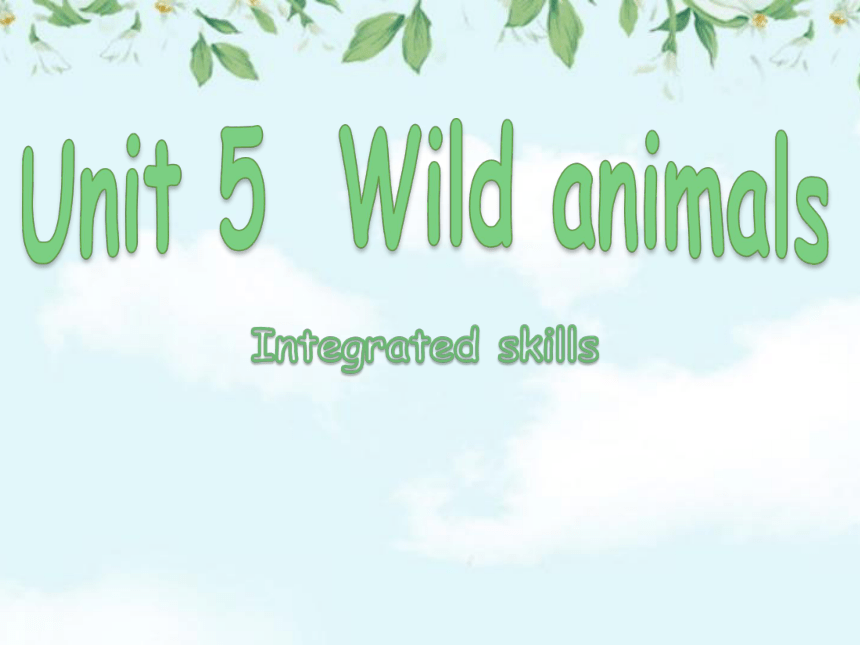 | |
| 格式 | pptx | ||
| 文件大小 | 3.3MB | ||
| 资源类型 | 教案 | ||
| 版本资源 | 牛津译林版 | ||
| 科目 | 英语 | ||
| 更新时间 | 2021-10-07 09:01:15 | ||
图片预览

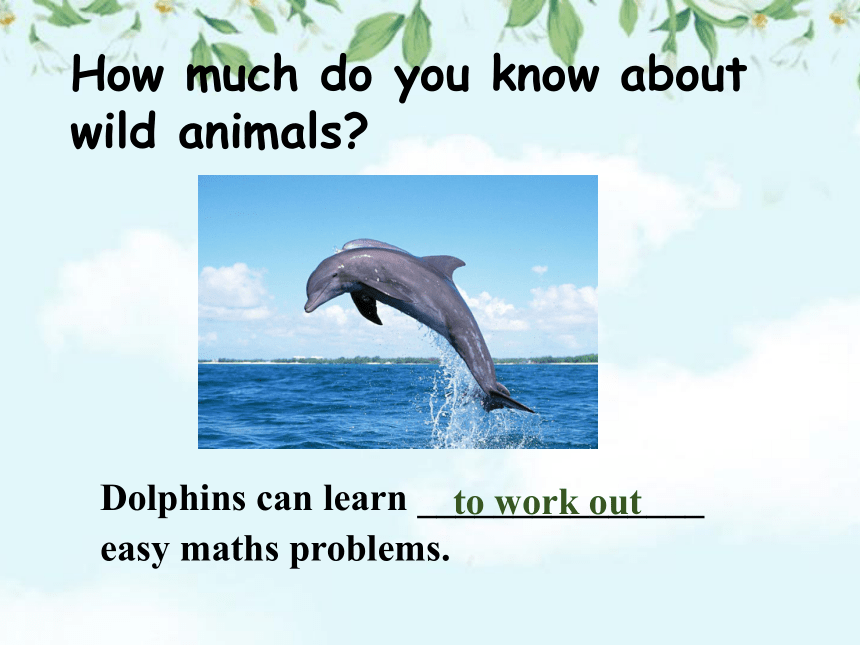
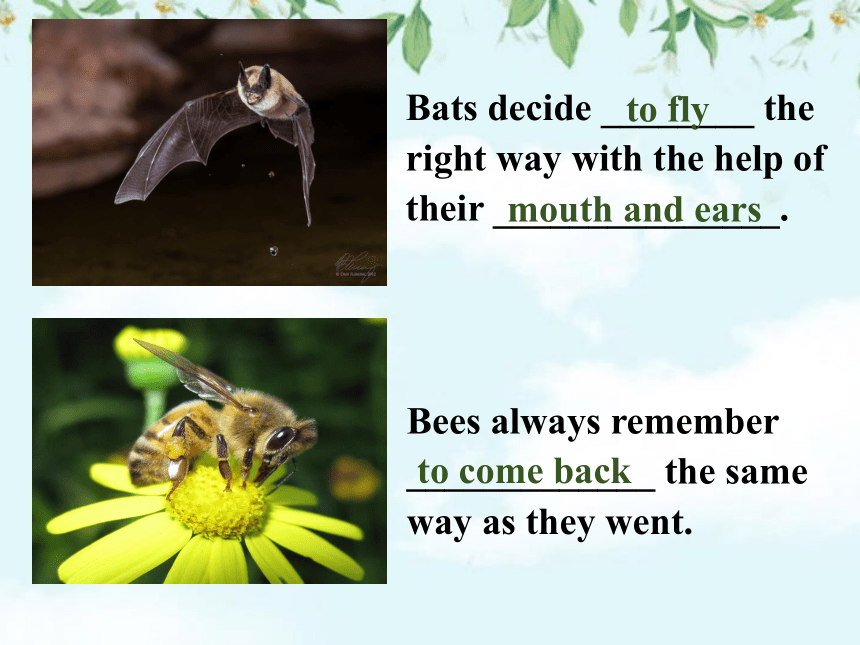
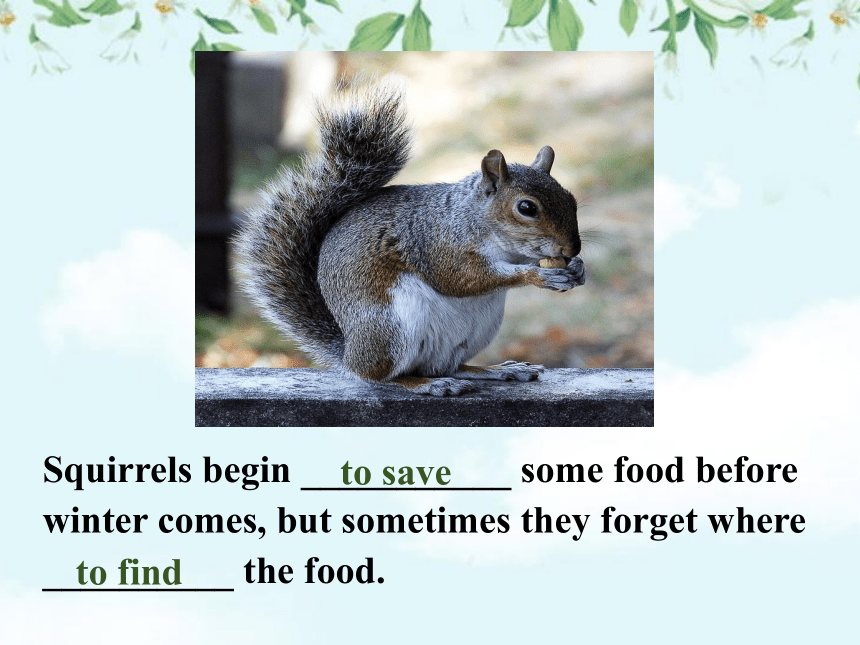
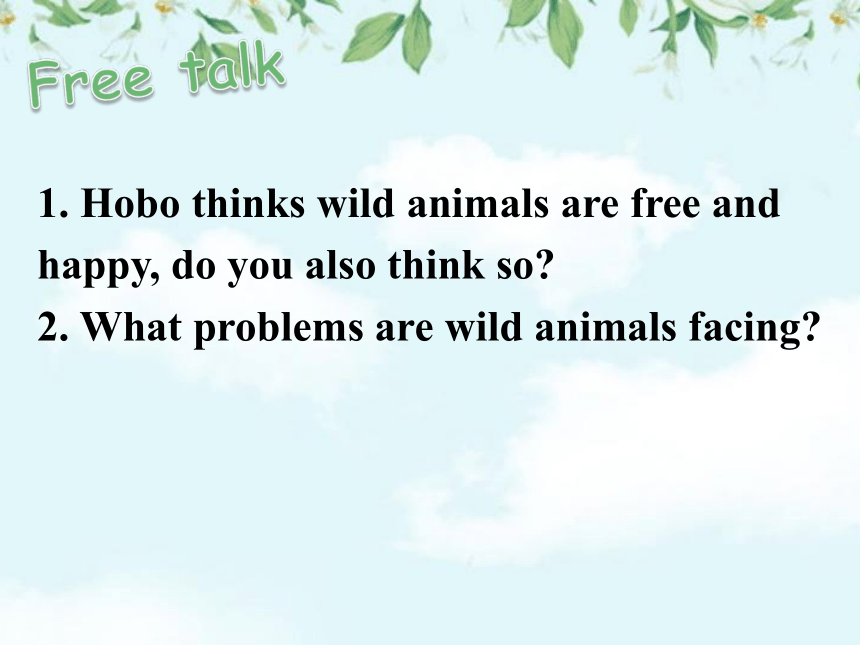

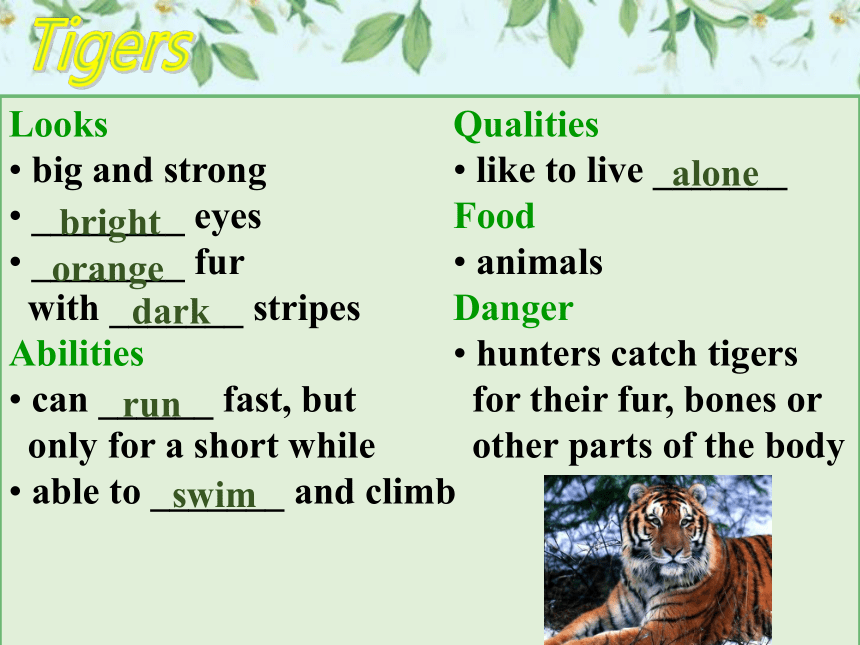
文档简介
(共17张PPT)
Unit
5
Wild
animals
Integrated
skills
How
much
do
you
know
about
wild
animals
Dolphins
can
learn
_______________
easy
maths
problems.
to
work
out
Bats
decide
________
the
right
way
with
the
help
of
their
_______________.
Bees
always
remember
_____________
the
same
way
as
they
went.
to
fly
mouth
and
ears
to
come
back
Squirrels
begin
___________
some
food
before
winter
comes,
but
sometimes
they
forget
where
__________
the
food.
to
save
to
find
Free
talk
1.
Hobo
thinks
wild
animals
are
free
and
happy,
do
you
also
think
so
2.
What
problems
are
wild
animals
facing
Today
we
are
going
to
learn
more
about
wild
animals.
We
will
talk
about
their
looks,
abilities,
qualities,
food
and
the
danger
they
face.
Listen
to
the
conversation
and
complete
the
fact
sheets.
Part
A
Helping
wild
animals
Looks
big
and
strong
________
eyes
________
fur
with
_______
stripes
Abilities
can
______
fast,
but
only
for
a
short
while
able
to
_______
and
climb
Qualities
like
to
live
_______
Food
animals
Danger
hunters
catch
tigers
for
their
fur,
bones
or
other
parts
of
the
body
Tigers
bright
orange
dark
run
swim
alone
Looks
not
very
_______
thick
________
Abilities
can
see,
hear
and
_____
things
far
away
can
run
for
_______
without
stopping
Qualities
often
work
as
a
team
never
kill
for
_____
Food
animals
sometimes
_______
Danger
losing
living
areas
people
kill
wolves
because
they
think
wolves
are
dangerous
to
humans
Wolves
big
fur
smell
hours
fun
fruit
Millie
and
Daniel
are
writing
a
letter
to
tell
people
why
it
is
important
to
protect
tigers
and
wolves.
Fill
in
the
blanks,
use
the
fact
sheets
in
Part
A1
on
page
63
for
information.
Dear
Sir
or
Madam,
We
are
writing
to
tell
you
about
some
wild
animals
in
danger.
Tigers
are
big
and
________.
They
have
very
________
eyes.
Tigers
like
to
live
______.
There
are
not
many
tigers
in
the
world
now.
Tigers
are
in
danger
because
people
catch
them
for
their
fur,
_______
or
other
parts
of
the
body.
strong
bright
alone
bones
Wolves
are
not
very
big.
They
can
see,
_______
and
______
things
far
away.
They
often
work
as
a
_____.
Sadly,
they
have
fewer
and
fewer
living
areas,
and
people
kill
them
because
they
think
wolves
are
__________
to
humans.
They
are
now
in
danger.
We
think
we
should
help
these
animals.
Yours
sincerely
Millie
Daniel
hear
smell
team
dangerous
Millie
is
talking
to
her
mum
about
how
to
protect
wild
animals.
Listen
to
their
conversation
and
answer
the
questions.
1.
Why
are
some
wild
animals
in
danger
They
lose
their
lives
because
people
hunt
them.
People
sell
their
fur,
bones
or
other
parts
of
the
body.
2.
What
can
we
do
to
protect
wild
animals
We
shouldn’t
buy
fur
coats
any
more.
Speak
up:
It's
a
great
pity!
Pair
work
S1:
I
read
a
report
about…today.
…are
killed
because….
S2:
Oh,
I’m
sorry
to
hear
that.
That’s
too
bad.
S1:
Yes.
I
think
it’s….
S2:
I
agree
with
you.
I’ll
tell
my
friends….
S1:
If
everyone
stops…,
then
hunters
won’t….
S2:
That’s
right./…
e.g.
tigers---bones---medicine
pandas---fur---clothes
Discussion
How
do
we
protect
wild
animals
Don’t
buy
clothes
made
of
animal
fur
2.
Don’t
hunt
animals
for
their
fur
or
bones.
3.
Don’t
hunt
animals
to
make
medicine.
4.
Improve
animals’
living
areas.
5.
Build
more
reserves.
6.
Don’t
pollute
our
environment.
7.
Don’t
cut
down
the
forests.
8.
We
can
also
write
to
WWF.
What
does
WWF
stand
for
World
Wildlife
Fund
世界野生生物基金会
Useful
phrases
and
expressions
1.
a
short
while=a
short
time
一会儿
after
a
while
过了一会儿
2.
things
far
away
远处的东西
3.
run
for
hours
without
stopping
不停奔跑几个小时
4.
work
as
a
team
团队合作
5.
kill
for
fun
为取乐而杀戮
6.
living
areas
生活区域
After
a
w_______,
the
hunter
hunted
a
rabbit.
2.
Tigers
are
good
at
_____________
(捕捉)
small
animals.
3.
After
a
long
___________
(讨论),
we
all
agreed
to
go
on
a
trip
to
the
zoo.
4.
Children
need
parents’
___________
(保护).
5.
What
a
s_______!
You
shouldn’t
bully
(欺侮)
the
weak.
6.
He
gave
me
a
special
present
yesterday,
but
I
didn’t
a__________.
Exercises
hile
catching
discussion
protection
hame
ccept
Thank
you!
Unit
5
Wild
animals
Integrated
skills
How
much
do
you
know
about
wild
animals
Dolphins
can
learn
_______________
easy
maths
problems.
to
work
out
Bats
decide
________
the
right
way
with
the
help
of
their
_______________.
Bees
always
remember
_____________
the
same
way
as
they
went.
to
fly
mouth
and
ears
to
come
back
Squirrels
begin
___________
some
food
before
winter
comes,
but
sometimes
they
forget
where
__________
the
food.
to
save
to
find
Free
talk
1.
Hobo
thinks
wild
animals
are
free
and
happy,
do
you
also
think
so
2.
What
problems
are
wild
animals
facing
Today
we
are
going
to
learn
more
about
wild
animals.
We
will
talk
about
their
looks,
abilities,
qualities,
food
and
the
danger
they
face.
Listen
to
the
conversation
and
complete
the
fact
sheets.
Part
A
Helping
wild
animals
Looks
big
and
strong
________
eyes
________
fur
with
_______
stripes
Abilities
can
______
fast,
but
only
for
a
short
while
able
to
_______
and
climb
Qualities
like
to
live
_______
Food
animals
Danger
hunters
catch
tigers
for
their
fur,
bones
or
other
parts
of
the
body
Tigers
bright
orange
dark
run
swim
alone
Looks
not
very
_______
thick
________
Abilities
can
see,
hear
and
_____
things
far
away
can
run
for
_______
without
stopping
Qualities
often
work
as
a
team
never
kill
for
_____
Food
animals
sometimes
_______
Danger
losing
living
areas
people
kill
wolves
because
they
think
wolves
are
dangerous
to
humans
Wolves
big
fur
smell
hours
fun
fruit
Millie
and
Daniel
are
writing
a
letter
to
tell
people
why
it
is
important
to
protect
tigers
and
wolves.
Fill
in
the
blanks,
use
the
fact
sheets
in
Part
A1
on
page
63
for
information.
Dear
Sir
or
Madam,
We
are
writing
to
tell
you
about
some
wild
animals
in
danger.
Tigers
are
big
and
________.
They
have
very
________
eyes.
Tigers
like
to
live
______.
There
are
not
many
tigers
in
the
world
now.
Tigers
are
in
danger
because
people
catch
them
for
their
fur,
_______
or
other
parts
of
the
body.
strong
bright
alone
bones
Wolves
are
not
very
big.
They
can
see,
_______
and
______
things
far
away.
They
often
work
as
a
_____.
Sadly,
they
have
fewer
and
fewer
living
areas,
and
people
kill
them
because
they
think
wolves
are
__________
to
humans.
They
are
now
in
danger.
We
think
we
should
help
these
animals.
Yours
sincerely
Millie
Daniel
hear
smell
team
dangerous
Millie
is
talking
to
her
mum
about
how
to
protect
wild
animals.
Listen
to
their
conversation
and
answer
the
questions.
1.
Why
are
some
wild
animals
in
danger
They
lose
their
lives
because
people
hunt
them.
People
sell
their
fur,
bones
or
other
parts
of
the
body.
2.
What
can
we
do
to
protect
wild
animals
We
shouldn’t
buy
fur
coats
any
more.
Speak
up:
It's
a
great
pity!
Pair
work
S1:
I
read
a
report
about…today.
…are
killed
because….
S2:
Oh,
I’m
sorry
to
hear
that.
That’s
too
bad.
S1:
Yes.
I
think
it’s….
S2:
I
agree
with
you.
I’ll
tell
my
friends….
S1:
If
everyone
stops…,
then
hunters
won’t….
S2:
That’s
right./…
e.g.
tigers---bones---medicine
pandas---fur---clothes
Discussion
How
do
we
protect
wild
animals
Don’t
buy
clothes
made
of
animal
fur
2.
Don’t
hunt
animals
for
their
fur
or
bones.
3.
Don’t
hunt
animals
to
make
medicine.
4.
Improve
animals’
living
areas.
5.
Build
more
reserves.
6.
Don’t
pollute
our
environment.
7.
Don’t
cut
down
the
forests.
8.
We
can
also
write
to
WWF.
What
does
WWF
stand
for
World
Wildlife
Fund
世界野生生物基金会
Useful
phrases
and
expressions
1.
a
short
while=a
short
time
一会儿
after
a
while
过了一会儿
2.
things
far
away
远处的东西
3.
run
for
hours
without
stopping
不停奔跑几个小时
4.
work
as
a
team
团队合作
5.
kill
for
fun
为取乐而杀戮
6.
living
areas
生活区域
After
a
w_______,
the
hunter
hunted
a
rabbit.
2.
Tigers
are
good
at
_____________
(捕捉)
small
animals.
3.
After
a
long
___________
(讨论),
we
all
agreed
to
go
on
a
trip
to
the
zoo.
4.
Children
need
parents’
___________
(保护).
5.
What
a
s_______!
You
shouldn’t
bully
(欺侮)
the
weak.
6.
He
gave
me
a
special
present
yesterday,
but
I
didn’t
a__________.
Exercises
hile
catching
discussion
protection
hame
ccept
Thank
you!
